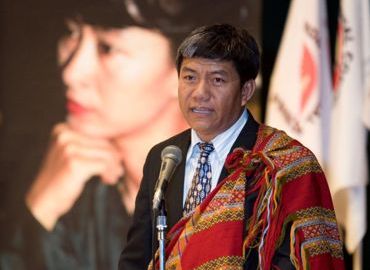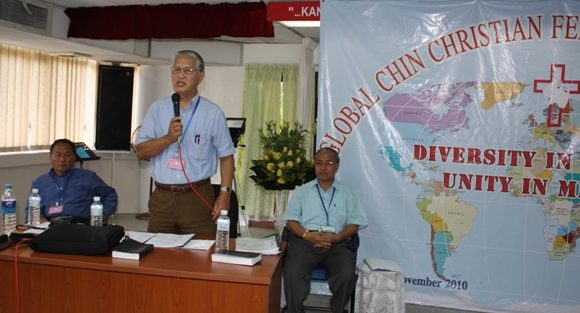Undying Hope for a Unified, Free and Democratic Burma

23 January 2010: [Note: With the Burmese Parliaments to be convened in a week time for the first time after the elections, Chinland Guardian is pleased to present the following excerpt of Lian’s acceptance speech during the award ceremony held at at the Norwegian School of Theology in Oslo, Norway.
Just two days after Burma’s 2010 General Elections, Victor Biak Lian, Chin human rights and democracy activist, was awarded St. Stephen’s Prize in Oslo, Norway on 9 November 2010. The human rights award by the Norwegian Mission to the East (NMTE) was presented to the 45-year-old ethnic Chin in recognition of his commitment and outstanding contributions to democracy, human rights and national reconciliation in military-ruled Burma.
Victor Biak Lian has tirelessly engaged in the struggle for democracy, human rights, national reconciliation and religious freedom in Burma for more than 22 years since the student-led 8888 nationwide uprising against the military dictatorship.
In his ‘moving and stimulating’ speech, the fourth St. Stephen’s Prize recipient highlighted a layer of human rights violations perpetrated against the people by Burma’s successive regimes and appalling situations facing the country.]
The reign of terror perpetrated by Burma’s military regime has affected hundreds of thousands of its citizens for many years. Today, the Chin Human Rights Organisation continues to document the suffering of the Chin people on the western front. The kinds of human rights violations suffered by the Chin people today are the same as those that have been extensively reported among ethnic Karen, Shan, and Karenni on the eastern border. These violations include arbitrary arrest and detention, forced labour, torture, rape and extrajudicial executions.
Chin people today estimate that around 90 percent of them are Christians. Christianity is an integral part of the culture for many Chins. Sadly, religious persecution at the hands of the military regime is a matter of primary concern.
The authorities have destroyed Christian crosses erected by churches on hilltops throughout Chin State, most recently in July this year. Construction of new church buildings is prohibited. Christians must obtain prior authorization for even renovation of church buildings, which is virtually impossible. In remote villages and other rural areas in Chin State, army units on patrols have frequently mistreated, assaulted and tortured Christian pastors.
It is very risky for us to document these human rights violations. I believe many violations have never been reported, due to the risks involved. Successive UN Human Rights Rapporteurs on Burma have criticized the most egregious violations committed by the regime. Many governments and the United Nations have expressed their concern and condemnation over the systematic and targeted violations against civilians and the complete impunity enjoyed by the regime. And yet little has changed.
As a result, more than 140,000 refugees languish on the Thai-Burma border in 9 refugee camps, providing a clear example that many citizens are not safe in their own country. Hundreds of thousands of villagers in the border areas are living as internally displaced persons. Over the past 10 years, more than 100,000 refugees have poured into Malaysia to seek refugee status, of which around half are Chin. Hundreds of thousands more struggle for survival in India and Bangladesh.
The route out of Burma and into exile is not easy. Refugees are forced to rely on human traffickers. Many have vanished between Thailand and Malaysia. The Chin Human Rights Organization has recorded the stories of Chins who have been sold into slavery on Thai fishing boats, and have miraculously managed to escape. There are reports of women being sold to brothels. Women are at high risk of abuse by brokers promising to smuggle them into safety.
I personally know several incidents of people who have died trying to get to Malaysia. In 2006, 40 people vanished in the Bay of Bengal when their small boat carrying more than 100 people was crushed by a fishing boat on Christmas Eve. Just this past May, 13 Chins, including women and children, were killed in a horrific car accident while trying to enter into Malaysia with the help of human smugglers. After being identified by the police, the driver refused to stop and a high-speed chase ensued, ending in the car flipping and hitting a tree after the police shot out a tire. 9 people died on the spot while 9 others suffered serious injuries; 4 more succumbed to their injuries and died in the hospital including 3 children. The rest survived but were arrested by the Thai police.
When I heard about the accident, I immediately rushed to meet the survivors in jail. I could see in their eyes that they expected something from me. One young boy rushed to me and asked “where are my uncle and brother?”A woman near him whispered to me that they died on the spot, and I realized that they must have been among the 13 bodies lying in the Buddhist monasteries. I couldn’t say a word to the boy. How could I tell him he would never see his brother and his uncle again?
It is not difficult to understand what forces hundreds of people to risk their lives every day to make this kind of journey. Aung San Suu Kyi once said that “we are prisoners of our own country” which is true for the entire population in Burma. More than 2,200 political prisoners are still being detained, demonstrating that the regime continues to be intolerant of political opposition. Some have been sentenced to 100 years imprisonment. Many suffer medical conditions, but are denied medical treatment by the authorities and refused permission to see their relatives and loved ones.
People live in extreme poverty. Food insecurity is everywhere in the country. Malnutrition rates are alarmingly high, particularly in the ethnic areas and conflict zones. Many households struggle from constant food shortages. For the past three years, large areas of Chin State have been devastated by a food crisis brought on by a rat infestation. In response to such humanitarian crises, the military government does nothing to assist the affected population, and instead continues to violate their rights with impunity.
Despite the desperate poverty experienced by much of the population, in 2007 the military regime removed fuel subsidies causing the price of diesel and petrol to sky rocket. If this kind of government action took place here in this country, how would citizens respond? The response in Burma was the 2007 Saffron Revolution. Instead of bringing about a much-hoped-for-change in the country, the revolution resulted in hundreds dead including monks at the hands of the military regime.
The problems we are facing are not easy to bear and they are many. They are real and not easy to solve. But I believe they can be solved.
You may know that two days ago, there was an election held by the regime in Burma. This was the first election held in Burma for the last 20 years. Two decades ago, the result of the 1990 election, in which the National League for Democracy won by a landslide, was not honored. Instead many were arrested and Aung San Suu Kyi, the leader of the NLD, was put under house arrest where she has remained for 13 years. In the follow-up to this election, many speculate that Aung San Suu Kyi might be released on 13 November. I pray that the speculation may become true.
What we do know is that the 7 November 2010 elections are designed to give legitimacy to the military government in Burma. We all know that it will not lead to democracy. Like the 1990 elections, the military will still be in control after the elections. There will most likely be a shift from direct and full military control, to indirect but full control.
On the other hand, the elections may provide a limited opportunity for the ethnic communities to once again legitimately fight for their rights through a controlled political process. Some ethnic communities participated and contested in the elections to make use of their right to legitimately represent their communities and promote the concept that governments must be elected by the people. They also believe that people have the right to choose their representatives and hope that they’ll be able to push for incremental reforms. We can only hope that this process will open the door for positive change in Burma.
Civil war can break out throughout the country any time soon as many ethnic ceasefire groups rejected the proposal of their army to transform into “Border Guard Force” under their command without any political dialogue and settlement.
We will be watching carefully as the political landscape unfolds. We will continue to press for justice and accountability for human rights violations; national reconciliation; and genuine democracy. We have to remain hopeful. Change that is small and slow can quickly become big and widespread. I believe that one day this change will come and that I may return to my homeland – not as a Chin or an ethnic national but as a member of a unified, free, and democratic Burma.





